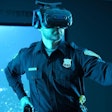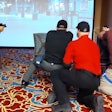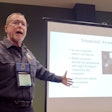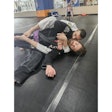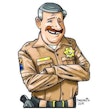At face value, there doesn't seem to be much difference between the words respond and react. However, if you take a moment to look at the words in a law enforcement context, there are significant differences. Reacting is guided primarily by emotion and responding is influenced by logic. In this context, it's not hard to see which one of the two is more beneficial to law enforcement officers.
Reacting
I am not suggesting that all reactions are bad. We need to hone several types of reactions to deal with exigent circumstances. These include self-defense situations. When someone is trying to take a swing at you, you don't have time to ponder your choices. Those aren't the types of situations I am talking about. I'm talking about the times when you do have time to make a choice. And therein lies the crux of the issue; the choices we make.
When you simply react to a given scenario, you seem defensive. If you are on the defensive you place yourself at a disadvantage. If you are to maintain law and order, you must maintain the initiative and continue to go forward in the problem-solving mode. This requires thought, not a "knee-jerk reaction."
The main issue with reacting is that it is emotionally driven. In law enforcement if you allow yourself to be driven by emotion your focus is lost and you lose sight of your primary objectives. When you react to poking the bear, you may end up on the evening news, and once there, you'll most likely be unfairly judged because of whatever 30-second media spin was placed on the event.
Responding
In most instances, responding calmly makes more sense because it's guided less by emotion and more by logic. Though responding may seem more passive, it is quite the opposite. Since it's a more active approach, it has more potential to influence the outcome of your interactions in a positive way.
When you respond, you are no longer being controlled by the event; you are taking measures to control it. Reacting without thinking creates yelling matches. Responding creates useful dialogue. I have learned the hard way that you can't stop your emotions and to try to do so would be counterproductive. The trick is to control what you do with them. It is a lesson that ought to be stressed early in everyone's career.
Understanding the Difference
A good analogy revolves around fear and danger. In a dangerous situation, fear inevitably pops up and creates a powerful emotional response that if left unchecked can cause you to run, freeze, or shutdown altogether. If allowed to fester, fear becomes your reaction to the danger, which leaves you wide open to its full effects; the exact opposite of what you want to happen. You need to focus on formulating a response that gives you a way to deal with the danger.
Our thoughts are what drive us. How we look at something helps define our actions. If you allow poking the bear to control you, then all your conflicts become a nail, and all your solutions become a hammer. That is not law enforcement but a battle of testosterone levels.
A simplified example of responding vs. reacting would be what might happen during a traffic stop. We have all been there where the person being stopped goes on a tirade about why you stopped him. Inevitably, his conversation always goes south and includes something about doughnuts, what part of the male anatomy you are, how he pays taxes and therefore your salary, and that he knows your CEO personally.
When that happens you have two choices; you can respond and remain in control or you can react by giving it back to them the same way they are going at you. Responding handles the situation. Reacting hardly ever handles the situation but always creates a complaint against you.
Officer Responding: In our traffic scenario, the officer who responds allows the driver to vent. As long as the driver is not making any hostile movements toward him, there is no need to escalate on his part. He continues active listening in order to respond to the driver's issues. When the person pauses, the officer responds with some options as to how the driver can handle his complaints and explains the process of handling the ticket. He remains calm because he understands it takes two to argue. When you remove that element, the only person the driver can argue with is himself. In the end, though probably still angry, the driver walks away with the citation and information on how to handle it. No escalation created.
Officer Reacting: The officer who reacts tries to be nice the first time but gets aggravated very quickly. He does not like being yelled at. He has also heard one doughnut joke too many today, and he has decided it will be the last time he is going to put up with it. He certainly tries to shut down the driver by talking over him, arguing back, and pushing his authority down the driver's throat. The driver becomes more enraged and argues more. The driver gets more animated with his gestures and moves closer to the officer. If unchecked, this situation could lead to an escalation resulting in an arrest, and possible use of force where none was originally needed. When you respond you make it personal by not focusing on the job and you allow yourself to be controlled by emotion, which never ends well.
How to Stay in Control When You Really Want to React
The main problem with reacting is that it may not lead you to the best course of action and outcome. Here are some suggestions that might help you reach a positive outcome:
- Know your own triggers. Being human means just that; you are not infallible. Everyone has a bad day and everyone has buttons that can be pushed. In order to lower the number of bad days, know what sets you off. Understand that these triggers are used against you and not for you.
- Pause. Many times you don't have to act right away. Breathe, quiet down the reaction voices screaming in your head, and focus instead on what needs to be done.
- Think. What separates us from the rest of the animal world is our ability to think. We can choose our behaviors before we do them.
- Observe outcomes. One of my wife's favorite sayings is, "…and how did that work out for you?" She usually says that when I react instead of respond. Look at what you've done in the past. If it didn't turn out well, then ask yourself why you are still doing the same things.
- Work on a better response. Since you know what your buttons are, practice your response. Visualization is no longer some new-age mumbo jumbo but a proven technique used by champions and warriors alike.
- Give yourself a break. If you do end up reacting, learn from it instead of beating yourself up over it. Life's best lessons are often learned the hard way. Wisdom doesn't come naturally; it's earned by dealing with life's obstacles.
- Stop blaming and start fixing. Stop pointing fingers at people and start defining problems so you can be part of the solution. It's easy to get caught up in the fault game but it does no good in the end. All it does is waste valuable time and fuel emotional reactions.
- Stop taking things so personally. Many of the comments from the street toward law enforcement come from ignorance. Not that everyone is stupid, but many people don't understand the law, policies, and what we actually do for a living. Their reactions tend not to have anything to do with you and everything to do with the situation they think they find themselves in.
- Make a play for middle ground. Start looking for commonality and work from there. Middle ground is a good starting point. Stop looking at it from the perspective of "them vs. us."
- Respond with purpose. If all you're going to do is inflame a situation, then keep your mouth shut. If what you say and do is not going forward toward a solution, then I would get some help as soon as possible and take a step back. Let somebody less sensitive to the current situation take lead. Laurence J. Peter, in his book "The Peter Principle," said it best: "Speak when you are angry and you'll make the best speech you'll ever regret."
What Would You Do?
As I write this, I'm thinking about the shooting of Michael Brown by a Ferguson (Mo.) Police Department officer on August 9. If the riots and protests that followed were not prime examples of the public reacting vs. responding I don't know what is.
Citizens, government officials, and the media were all guilty of reacting before all of the facts were known, which only served those interested in furthering their own personal agendas. A great deal of time and effort was wasted dealing with self-interest instead of dealing with the issues confronting the residents of Ferguson.
As the dust settles in Missouri, the question that remains for the rest of us is how would we handle a similar situation? Would you choose to react or would you choose to respond?
Amaury Murgado is a special operations lieutenant with the Osceola County (Fla.) Sheriff's Office. He is a retired master sergeant from the Army Reserve, has over 27 years of law enforcement experience, and has been a lifelong student of martial arts.









